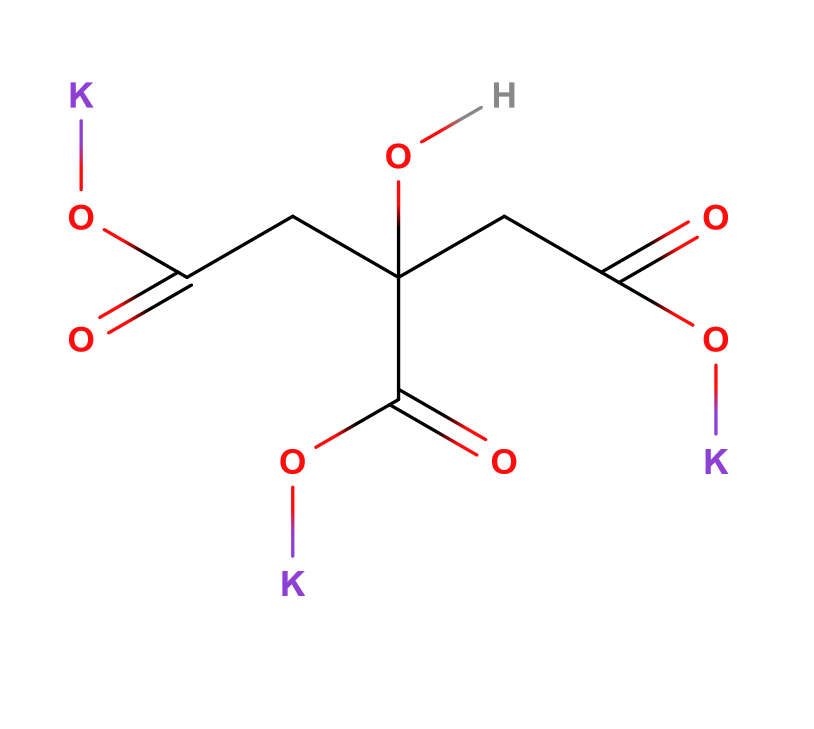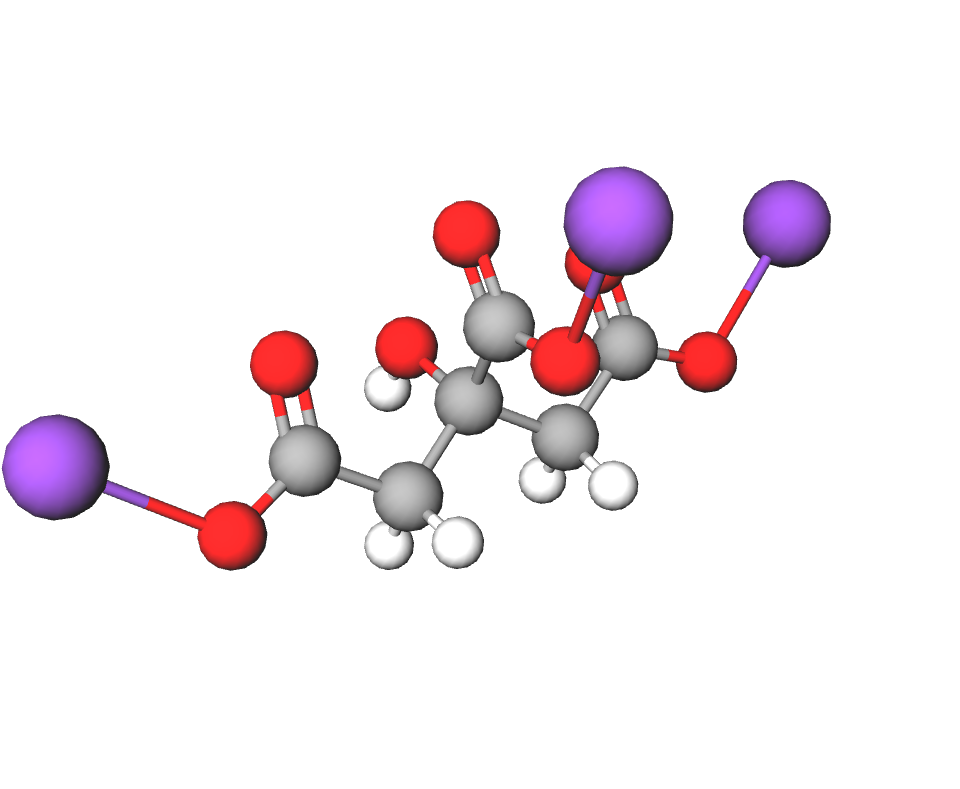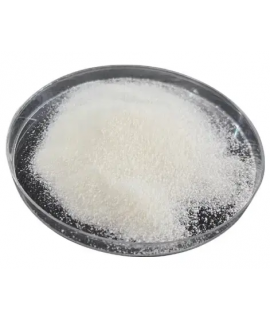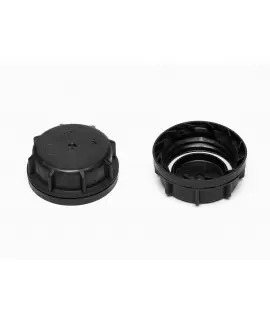TRIPOTASSIUM CITRATE 99% (E332 food grade), kg
7.90 €
Potassium citrate, CAS 866-84-2, potassium salt of citric acid, INCI POTASSIUM CITRATE, E332, TPC, biopotassium, organic potassium
Parameter | Attribute |
Tripotassium citrate | Potassium salt of citric acid, E332, TPC, biopotassium, organic potash |
Formula | K3C6H5O7 |
Structure |   |
IUPAC | Tripotassium 2-hydroxypropane-1,2,3-tricarboxylate |
INCI | POTASSIUM CITRATE |
CAS | 866-84-2 |
Molar mass | 306,395 g/mol (anhydrous), 324,42 g/mol (monohydrate), |
Density | 1.98 g/cm3 |
Solubility | In water: 150 g/100 mL (20 °C) Soluble in glycerol, insoluble in ethanol (95%) |
Tripotassium citrate comes as clear crystals or a white granular powder. It is an odorless, cooling, salty-tasting substance. It becomes slightly fluid on exposure to moist air, freely soluble in water and almost insoluble in ethanol (96 %). Unlike other potassium salts, it is less bitter and can therefore be used in higher concentrations. Tripotassium citrate is a non-toxic, slightly alkaline salt with low reactivity. It is chemically stable if stored at ambient temperature. In its monohydrate form it is highly hygroscopic and must be protected from exposure to moisture.
In food and beverages, tripotassium citrate is used as a spice, flavoring additive or preservative. In the EU, citric acid additives in foodstuffs are labelled with indicator E - E332. It is most commonly found in carbonated soft drinks as a subtle acidic flavor. It is milder than citric acid. In ice cream, potassium citrate is used as an emulsifier, preventing the fat from separating from the whole mass, and in caramel, it prevents the formation of sucrose (sugar) crystals on the surface of the caramel (inhibits the crystallization of sucrose). In cheese production, potassium citrate is used as a stabilizing emulsifier which prevents the cheese from becoming sticky when melted and prevents the fat from separating from the protein. It stabilizes dairy and soya products during heat treatment. Potassium citrate is commonly found in powdered milk in sauces, sausages (mostly bratwurst type), yoghurts, jams, fruit jellies and wines.
In cleaning, as a means or agent (additive) for the formation of complex compounds. Potassium citrate forms compounds with metals, making them soluble. It binds the metals in a chelate form, i.e. the metal ions become soluble, do not react with other compounds and do not precipitate. It effectively cleans and prevents the formation of new lime deposits in water evaporators, boilers, kettles etc. Used in coffee machine descalers, both liquid (as a component) and solid (both pure and as a co-formulant). Trisodium citrate can be used as a pH buffer, i.e. as a stabilizer, when mild acidity is required and stability is needed.
In cosmetics, tripotassium citrate is used in almost all cosmetic products as an ingredient to adjust the pH value. It can be used as a skin and facial care agent to remove dead cells from the skin and accelerate the formation of new ones. Tripotassium citrate is suitable for facial masks by replacing citric acid to produce a milder acid, but retaining the same exfoliating properties (the crystalline structure of tripotassium citrate is quite similar to citric acid). Potassium citrate is used in the manufacture of toothpastes to reduce tooth sensitivity to pain. Main INCI functions:
- pH adjuster: Stabilizes the pH of cosmetics
- Chelating: Reacts and forms complexes with metal ions which may affect the stability and/or appearance of cosmetic products.
Medicine. Tripotassium citrate is converted into carbonate ions in the body during metabolism, thereby raising the pH of the blood, i.e. alkalinizing the body. It is used to treat metabolic acidosis in the body. Prevents the formation of kidney stones by binding calcium. It is a good antioxidant which neutralizes free radicals that promote the formation of cancer cells (tumours). Helps the body to better absorb minerals from foods. Can cure a sore throat by killing the bacteria that cause infection - rinse the throat with an aqueous solution of sodium citrate. Trisodium citrate is used to treat symptoms of inflammation of the urinary tract. Potassium citrate, taken orally, is rapidly absorbed and excreted in the urine. As it is an alkaline salt, it is effective in reducing the pain and frequency of urination when caused by highly acidic urine. It can also be used as a non-irritant diuretic. Potassium citrate is an effective tool for the treatment and/or management of arrhythmias if the patient has hypokalaemia. Potassium citrate is an excellent source of the electrolyte potassium (K+) as it contains 38% potassium and is in an organic form. Otherwise known as "biopotassium". It is widely used to treat urinary calculi (kidney stones) and is often used by patients with cystinuria. It is also used as an alkalizing agent in the treatment of mild urinary tract infections such as cystitis.
In veterinary medicine, tripotassium citrate is used to treat the urinary tract of cats and dogs where pain is caused by highly acidic urine. As it is an alkaline salt, it is effective in reducing the pain and frequency of urination and is also used as a non-irritant diuretic.
In wood preservatives potassium citrate is used as a fire retardant. Softwood is one of the main building materials used worldwide. As wood is highly flammable, it needs to be treated by certain methods to make it suitable for use in the construction industry. Potassium citrate has the property of acting as a flame retardant. For example, potassium citrate is already widely used in cigarette paper to control the burning rate of cigarettes. Wood impregnated with a TPC solution not only protects the wood from ignition, but also produces an unburnable charring which further protects the lower layers of the wood from fire. After the test, the wood was impregnated with a 30 % TPC solution. The impregnated wood was then burned for 120 seconds with a vertical flame. The flame was observed to be rapidly extinguished with burn marks less than 150 mm. In addition, a non-combustible layer could be detected which protected the underlying layers. TPC is one of the few fully biodegradable and non-toxic flame retardants.
In crop and horticulture, tripotassium citrate is used as a preservative for cut flowers, which helps to keep flowers from wilting longer by increasing electrolytes, helping to retain moisture in the plant and being one of the main sources of macronutrients. It can be found in concentrated fertilizers, where the organic form of macro- and micronutrients is very important. It is used in agricultural products as a surfactant, which helps the active components to mix better and penetrate through the leaves when spraying the plants, and at the same time increases the plant's metabolism by increasing the potassium content.
Other uses of tripotassium citrate: Citric acid salt Potassium citrate is used to regulate the burning rate of cigarette paper. Without it, cigarette paper would burn very quickly before the tobacco burns, and when impregnated, it burns at the same rate as tobacco without losing the shape of the cigarette.
Important: Add the item to your basket, fill in the recipient's details and confirm your order. Thank you!
To save your precious time, we will deliver your order to your address at a time convenient for You!
*- The pictures of the goods may not correspond to the actual appearance, color, assembly or shape of the goods and their packaging. The information in the product description is of a general nature and may not correspond to the information on the packaging of the product and may not be the exact use of the product. The information given on the stocks and prices of goods may, in certain cases, differ from the actual prices and stocks of goods
**- The product complies with the requirements for food additive E332 but is not intended for use as a food additive.
Signal word: Not applicable |
Hazard icons: Not applicable |
Danger phrases: Not applicable |
Precautionary statements: Not applicable |
Related products
(8 other products in the same category)










